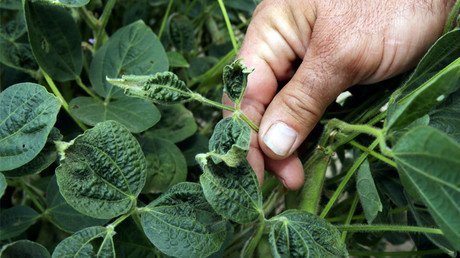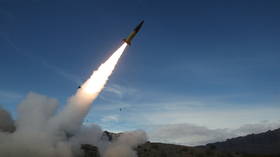Chemical brothers: Monsanto & BASF knew for years their products destroy US farms, documents reveal
US agro-chemical firm Monsanto and Germany's BASF were aware for a long time that their plan to introduce a new agricultural seed and chemical system would probably lead to damage on many US farms.
According to internal documents seen by the Guardian, the firms disregarded the risks even while they planned on how to profit off farmers who would buy Monsanto's new seeds just to avoid damage.
The documents (some of them date back more than a decade) have been uncovered during a recent successful $265 million lawsuit brought against both firms by a Missouri farmer.
They also revealed how Monsanto opposed some third-party product testing, in order to curtail the generation of data that might have worried regulators.
In some of the internal BASF emails, employees were joking about sharing "voodoo science" and hoping to stay "out of jail."
Also on rt.com Monsanto sues California over weed killer cancer warningsRecords showed that at private meetings dating back to 2009, agricultural experts warned that the plan to develop a dicamba-tolerant system could have catastrophic consequences.
Dicamba herbicide would normally kill crops such as soybean or cotton, but Monsanto altered the genes in these crops to create genetically modified varieties which are resistant. This meant that farmers can spray the weedkiller directly on those soybean or cotton plants to destroy weeds but leave the crops unharmed.
The experts told Monsanto that farmers were likely to spray old volatile versions of dicamba on the new dicamba-tolerant crops. They have warned that even new versions were still likely to be volatile enough to move away from the special cotton and soybean fields on to crops growing on other farms.
What is more important, under the system designed by Monsanto and BASF, only farmers buying Monsanto's dicamba-tolerant cotton and soybean seeds would be protected from dicamba drift damage.
According to a report prepared for Monsanto in 2009 as part of industry consultation, such "off-target movement" was expected, along with "crop loss", "lawsuits" and "negative press around pesticides." Monsanto's own projections estimated that dicamba damage claims from farmers would total more than 10,000 cases, including 1,305 in 2016, 2,765 in 2017 and 3,259 in 2018.
Both Monsanto and BASF defended their products, claiming dicamba is safe "when used correctly," and an important tool for farmers. Industry estimates suggest that several million acres of crops have now been reported damaged by dicamba. More than 100 US farmers are engaged in litigation in federal court alleging Monsanto and BASF collaboration created a "defective" crop system that has damaged orchards, gardens and organic and non-organic farm fields in multiple states.
The first trial over dicamba damage ended last month with a $265 million jury verdict against Monsanto and BASF. The jury found on behalf of Missouri peach farmers Bill and Denise Bader that dicamba ruined their 34-year-old family farm as the drift has damaged 30,000 peach trees.
The family's attorney Bill Randles said the companies' actions to encourage widespread spraying of dicamba over large areas created an "ecological disaster."
"The documents are the worst that I've ever seen for any case that I've worked on," said lawyer Angie Splittgerber, a former tobacco industry defense attorney who works with Randles. "So many of them put things in writing that were just horrifying."
For more stories on economy & finance visit RT's business section















